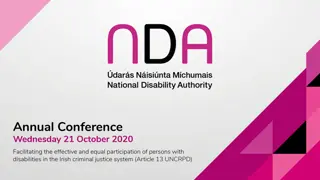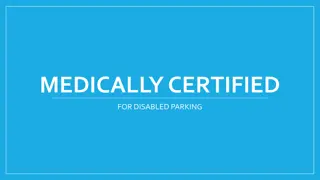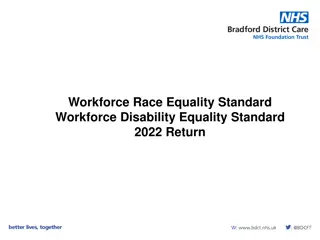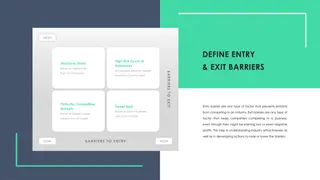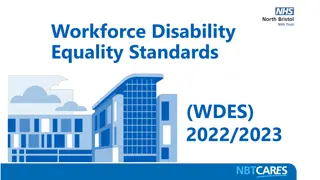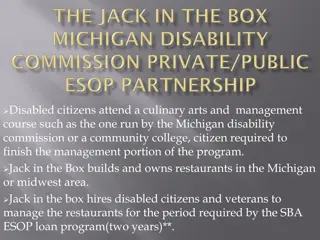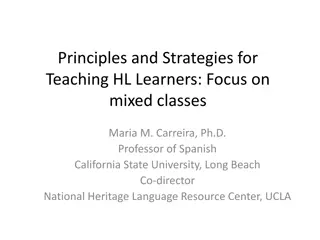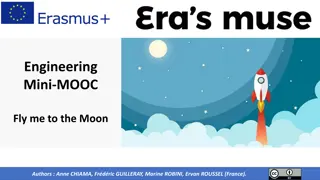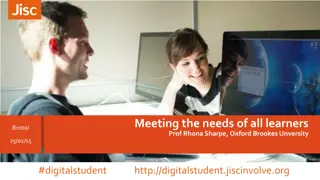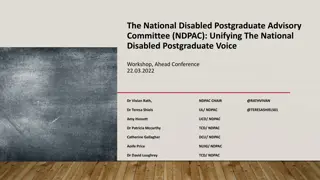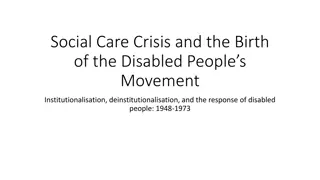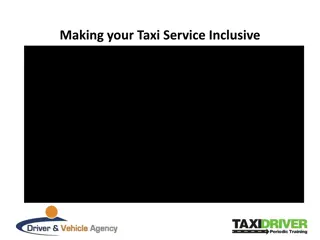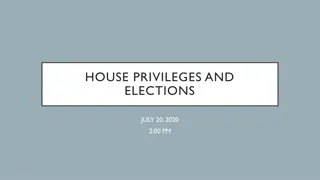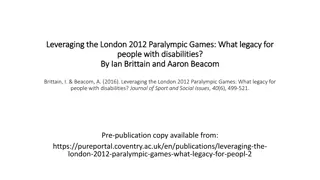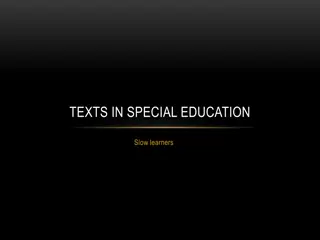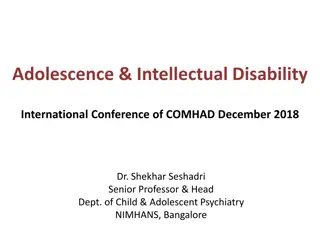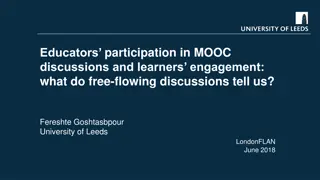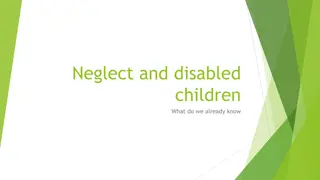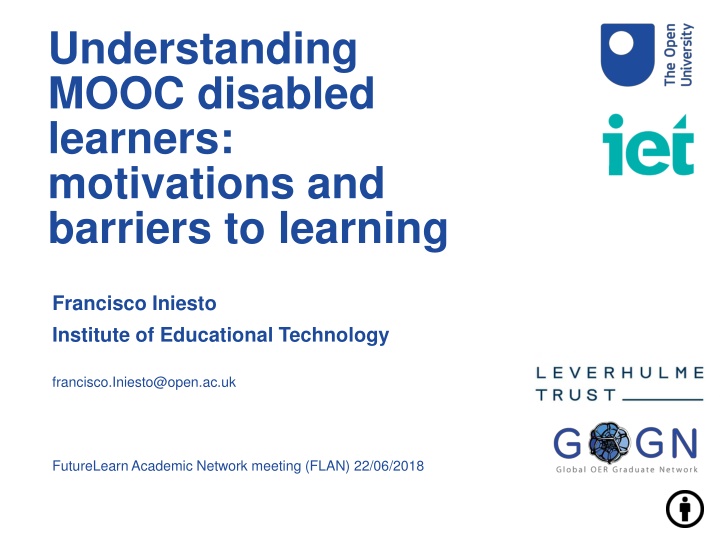
MOOC Disabled Learners: Motivations & Barriers
This study explores motivations and barriers faced by disabled learners in MOOCs. It delves into accessibility audits, provider and learner perspectives, and insights gathered from interviews and surveys, shedding light on the challenges and experiences of disabled individuals in online learning environments
Download Presentation

Please find below an Image/Link to download the presentation.
The content on the website is provided AS IS for your information and personal use only. It may not be sold, licensed, or shared on other websites without obtaining consent from the author. If you encounter any issues during the download, it is possible that the publisher has removed the file from their server.
You are allowed to download the files provided on this website for personal or commercial use, subject to the condition that they are used lawfully. All files are the property of their respective owners.
The content on the website is provided AS IS for your information and personal use only. It may not be sold, licensed, or shared on other websites without obtaining consent from the author.
E N D
Presentation Transcript
Understanding MOOC disabled learners: motivations and barriers to learning Francisco Iniesto Institute of Educational Technology francisco.Iniesto@open.ac.uk FutureLearnAcademic Network meeting (FLAN) 22/06/2018
2015 Settlement with edX 2017 Berkeley
Introduction and related work MOOC Learning,benefits such as: Openness Low cost Ubiquity (Time, place and pace) Acquiring knowledge Social learning: Connectivism Achieving new competences Develop professionally
Studies Study C: MOOC accessibility audit Study A: The perspectives of providers Study B: The perspectives of learners 1. Accessibility heuristic evaluation 2. UX walkthroughs and design in learning 3. Quality of the design 4. Universal design for Learning (UDL) 15 interviews with disabled learners 26 Interviews with MOOC providers and those with a range of expertise in the MOOC community Pre and post MOOC survey data from 14 Open University MOOCs at FutureLearn Being tested on FutureLearn, edX, Coursera and Canvas.
Interviews with learners Pre and post course survey data from 8 Open University MOOCs at FutureLearn (2015) Total learners interviewed 15 Profile Demographic information, Location Areas of interest and expectations Pre-Course survey Learning outcomes, Completion, Devices used. MOOC structure and interactivity, Learning experience, Educators and Evaluation Post Course survey Pre- Interview Profile questionnaire
Interviews with learners Age 6.60% Disability 20.00% 22.50% Unseen disabilities Fatigue or pain 16.10% Mental health difficulties 9.70% Personal Care Support 3.20% 46.60% 20.00% Learning difficulties 9.70% Restricted manual skills 12.90% 6.60% Restricted mobility 9.70% 65+ 56-65 46-55 36-45 26-35 Hard of hearing 9.70% Partially sighted 6.50% Educational qualification Employment status School-leaving qualification Bachelors university degree No formal qualification Full-time employed 6.60% 6.60% 6.60% 6.60% 26.60% Disabled and not able to work 6.60% 33.30% Retired 13.30% Postgraduate Unwaged and seeking employment College diploma or certificate Undergraduate 20.00% Unwaged with domestic responsibilities Full-time carer for severely disabled familiar 13.30% 20.00% Graduate school university degree 26.60% 13.30%
Relevant quotes: Motivations I was interested, as my job at the time was very mundane and unchallenging. I felt I was missing out on learning about new and interesting topics. I felt unchallenged and wanted to challenge myself and use my brain more to better myself and absorb more knowledge. Rebecca (LD , 26-35, Undergraduate, Full-time employed) - Expectations Education and information is power! Education shouldn't be only for the wealthy. Everyone should have the opportunity to access high quality educational materials to inspire future learning and personal advancement. Cecilia (LD, 36-45, College diploma, Full-time employed) - Open Education It only helps me on a personal level as a sense of achievement that I have completed the course and so a pat on the back. When talking about the MOOCs to other people which I do a lot of, recommending them, I can share my Certificate and say if I can do it so can you! For other learners it is showing their employer that they are interested in learning more and especially if is in relation to their work. Deborah (DHH, 56-65, School-leaving qualification, Full time carer for severely disabled familiar) - Professional development
Relevant quotes: Barriers Gemma, PC, FP, UD, 36-45, Postgraduate, Disabled and not able to work My health issues (fatigues, concentration issues, seizures limiting screen time) mean I can't always do the whole course as set out and I'm usually weeks behind and trying to catch up. Also any that are just videos of lectures put up with little extra info (no transcript for example) Barrier I emailed FutureLearn to complain about the changes to their structure and got a standard reply and a link to an online discussion which had been closed to further comment. For edX, the university involved was happy to tell me that the course was still available and encouraged me to be sure and read other learners responses and uploads to learn from even if there was no longer tutor access. Response Ensuring a transcript is available for video lectures would help a lot (edX is the best at this and should be emulated, their transcript scrolls up in a window alongside the video as it plays). Not removing access to courses as soon as the deadlines have been reached, or in the case of FutureLearn's new policy, allowing more time before it all reverts to paid access only. Solution
Online surveys Analyse pre and post course survey data from 14 Open University MOOCs at FutureLearn (2013-2015) Post- Course Survey Pre-Course Survey Profile Demographic information, Location Areas of interest and expectations Learning outcomes, Completion, Devices used. MOOC structure and interactivity, Learning experience, Educators and Evaluation Pre-Course survey Post Course survey % Disabled Learners (Total) Name of course Basic Science Understanding Experiments Elements of Renewable Energy Get Started with online learning Introduction to Cyber Security Introduction to Ecosystems Learn to code for data analysis Managing My Money Moons Smart Cities Start Writing Fiction The Business of Film The Lottery of Birth The Science of Nutrition Understanding Musical Scores Total 13.3% (804) 20.9% (163) 11.6% (974) 11.3% (150) 15.2% (1668) 15.7% (280) Percentage of cases 7% Other disabilities 9.4% (6065) 9.9% (1049) 6% Autistic spectrum disorder 13.1% (734) 12.1% (240) 26% Unseen disabilities 31% Fatigue or pain 8.8% (3454) 7.6% (158) 4% Personal care support 13.1% (1401) 11.8% (1251) 5% (1020) 14.2% (5215) 8.3% (977) 13.5% (1426) 10.5% (2813) 12.4% (394) 12.2% (935) 2.9% (137) 16.0% (714) 9.6% (240) 7.3% (96) 12.0% (702) 23% Mental health difficulties 18% Dyslexia or other specific 3% Impaired speech 10% Restricted manual skills 30% Restricted mobility 12.8% (1631) 14.0% (371) 13% Deaf or hard of hearing 5% Blind or partially sighted 29433 5629
Demographics 58.9% Female 52.3% 53.0% 41.1% 2.6% Male 47.7% Doctorate 4.6% 47.0% 4.4% 22.4% Postgraduate 32.1% 13.9% 31.0% Over 65 years 10.2% 10.6% 31.9% Undergraduate 33.9% 33.7% 21.4% 56-65 years 15.8% 17.6% 16.5% College diploma 13.0% 13.5% 16.6% 36-45 years 8.0% 18.8% School-leaving qualification 6.4% 18.5% 6.6% 4.8% 14.7% No formal qualification 1.8% 26-35 years 21.3% 2.1% 20.5% 8.8% 22.4% 19-25 years 11.4% Retired 15.9% 11.1% 16.6% Unwaged and seeking employment 4.4% 26.5% 4.3% Overseas 4.3% 43.2% 41.3% 6.0% Full-time student 7.4% 7.3% 73.5% Uk 56.8% 58.7% 14.0% Part-time employed 15.1% 15.0% Non English 11.1% 29.0% 28.1% 27.0% Full-time employed 51.6% 49.0% 88.9% English 71.0% 73.0%
Interest and online learning (PRE) Why are you interested in studying this course? 25.1% To learn more flexibly around my other commitments 21.6% 22.0% What sort of online course have you taken? 26.0% To try out learning online 21.7% 22.1% 23.9% An online course based around OER 45.9% 17.7% The course was free 37.5% 18.4% 38.4% 30.4% An online course for university credit 20.8% 22.4% To prepare me for future study 16.6% 23.3% 17.1% An online course for continuing professional 29.6% 88.2% 34.0% Personal interest 84.8% 33.5% 85.2% 19.2% Relevant to my work 27.8% 26.8% 29.9% Professional development 40.2% 39.1% 6.9% To improve my English 11.2% 10.7%
Expectations (Post) To what extent did FutureLearn meet your expectations in terms of the following? Fall below expectations Exceeded expectations My overall expectations of the course 71.2% 39.9% 64.6% 36.6% 65.5% 37.1% 14.9% 15.4% Improving my career prospects 11.3% 22.2% 11.8% 21.2% Learning more flexibly around my other commitments 47.2% 9.8% 42.9% 13.1% 43.5% 12.6% 34.6% 21.0% Preparing for further studies 24.4% 18.5% 25.8% 18.9% 75.5% 35.0% Learning new things 68.9% 35.8% 69.8% 35.7% Adding a fresh perspective to my current role 28.8% 18.9% 26.1% 16.2% 26.5% 16.5% Supplementing my existing studies 37.1% 17.5% 28.1% 19.6% 29.3% 19.3%
Following actions (Post) As a result of using this Open University course, are you more or less likely to do the following? less likely More likely Study more free Open University materials 67.8% 18.2% 63.4% 15.8% 64.0% 16.1% Visit related museums, exhibitions, galleries, etc. 45.2% 23.3% 45.9% 15.0% 45.8% 16.0% 58.5% 23.3% Look at other related materials 57.2% 16.0% 57.4% 16.9% Take part in other online activities 36.3% 43.2% 34.7% 37.6% 34.9% 38.3% 61.1% 24.4% Research this subject further 57.8% 25.6% 58.2% 25.5% Take a paid-for course in this subject area 34.2% 52.3% 38.4% 40.6% 37.9% 42.0% Take another free course in this subject area 68.6% 11.9% 67.0% 11.2% 67.2% 11.3%
Conclusions Disabled learners are particularly interested in taking up MOOCs, for personal interest, to determine if they can study at a higher educational level and to get flexibility and free education. They are less interested in the relevance of the MOOC to their work, or professional development. Disabled learners have previous experience in online courses that allows them to get university credit, which is related to their interest in studying at a higher educational level. They have less experience of participating in online courses for continuing professional development.
Limitations and Future work A simple disability marker may not reflect diversity within the population. It should not be assumed that these results generalise to the whole of the disabled learner population. Including categories of disability will provide greater insight into differences within the population of disabled learners. Extensions to the analysis approach to include clustering of responses, and identification of correlations. Deeper understanding of the qualitative data. Work in validation with the quantitative data.
Understanding MOOC disabled learners: motivations and barriers to learning Francisco Iniesto Institute of Educational Technology francisco.Iniesto@open.ac.uk FutureLearn Academic Network meeting (FLAN) 22/06/2018

